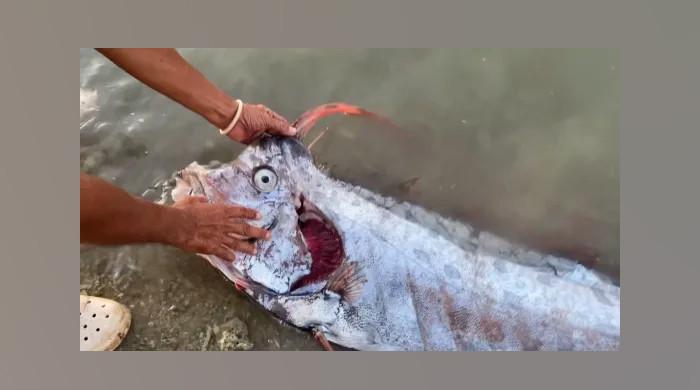A recent catch by a fisherman has fuelled the superstition that is to be linked with a fish that appears in the shallow waters only when there is an anticipation of an incoming disaster.
A man in the Philippines caught a doomsday fish just hours before a deadly 7.4 earthquake shook Taiwan which is regarded as the most potent in 25 years.
The Oarfish lives under the depths of 3,300 feet of the ocean however, according to the Japanese beliefs, it comes in shallow waters when there is a seismic occurrence, according to Metro News.
The report also noted that the fish was found in Kalanggaman Island, around 900 miles south of the epicenter of Hualien County.
While talking about the catch, Brenjeng Caayon said it’s no coincidence, linking it with the superstition saying: “This is a bad omen.”
“And it might be an omen because just this morning an earthquake rocked Taiwan. I didn’t believe it before, but now I’ve started to. I own the fishing boat, and I had three fishermen onboard. The crew didn’t know the kind of fish – it was their first time to see it.”
The Taiwan earthquake killed at least 9 people and injured over 1,000.
The earthquake superstition is based on Japanese mythology, which states that the slender plankton eater will intentionally rise to the surface and beach themselves ahead of an impending tremor.
“When I saw it, I recognised it immediately; I’ve already seen an oarfish before, but not this huge,” the 53-year-old said.
The fish was nearly five feet long and weighed 15kg.
A similar fish was also caught last year with a rare and unusual silvery white monstrous fish with big eyes and mysterious holes in its body.
According to divers, the “earthquake omen fish” measured around 6-and-a-half feet long.
These fears increased during the 2011 Fukushima earthquake and tsunami, as dozens of these marine creatures had washed ashore in the two years preceding the devastation.
“There is no scientific evidence of a connection, so I don’t think people need to worry,” declared Hiroyuki Motomura, a professor of ichthyology at Kagoshima University.

